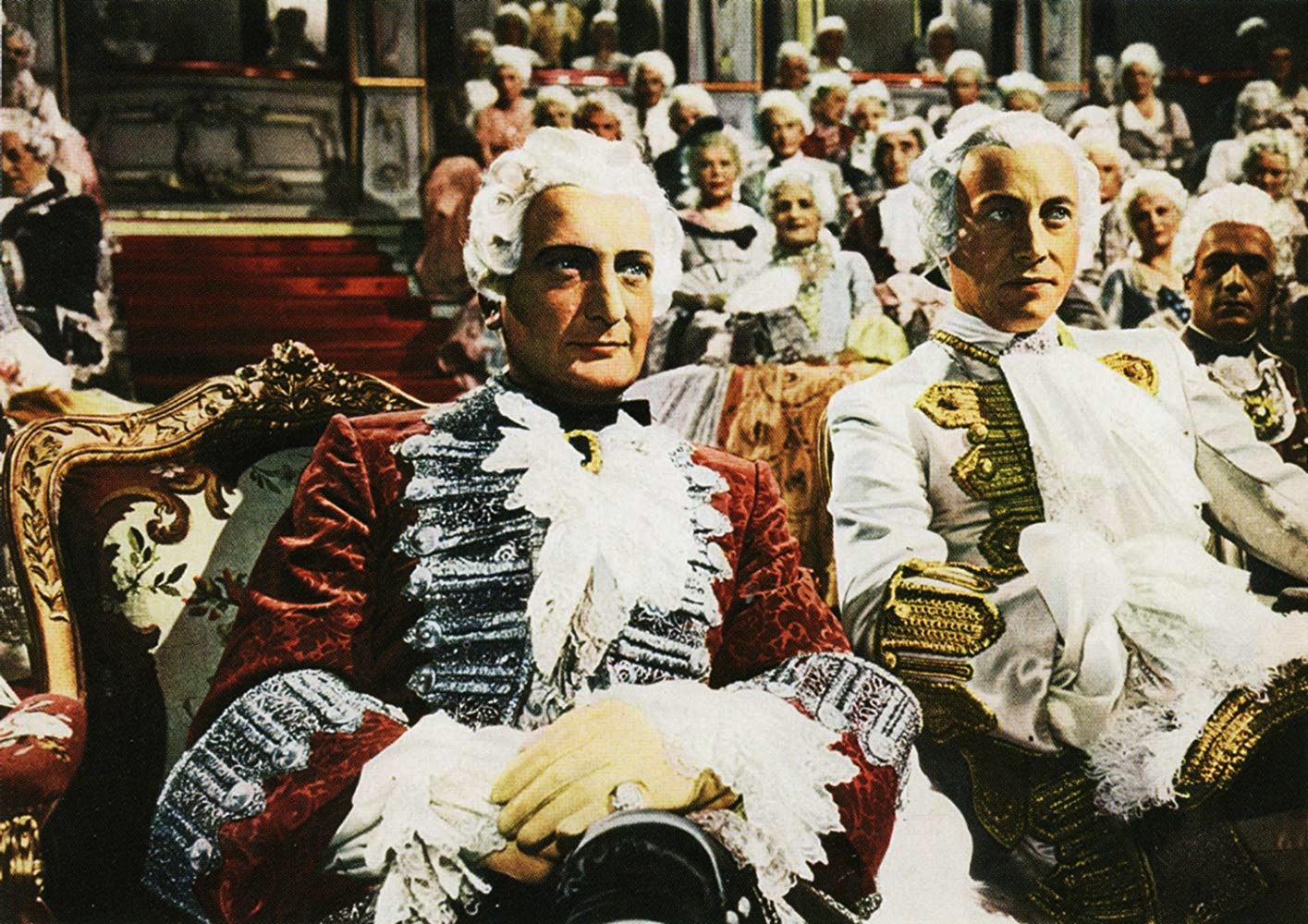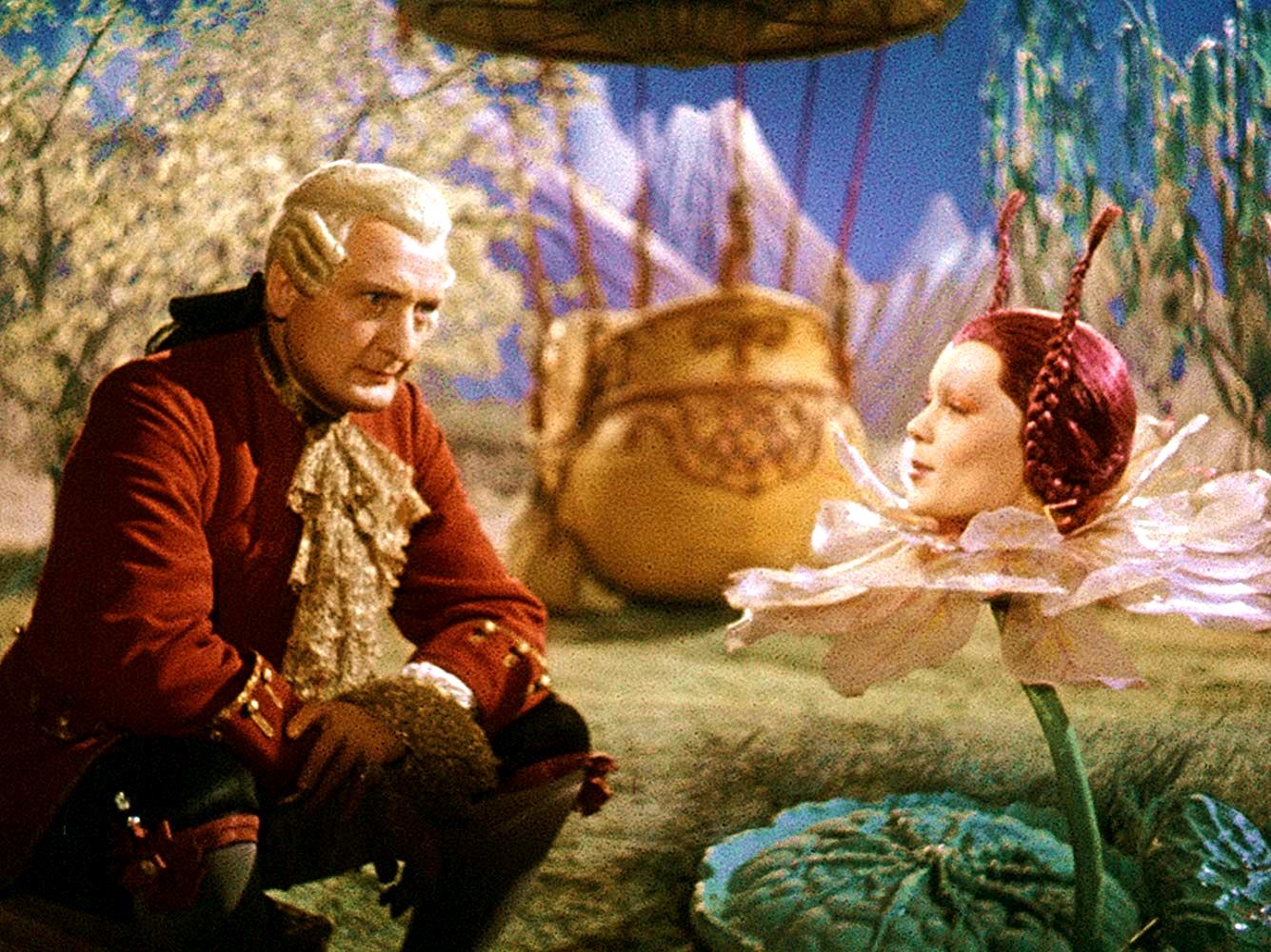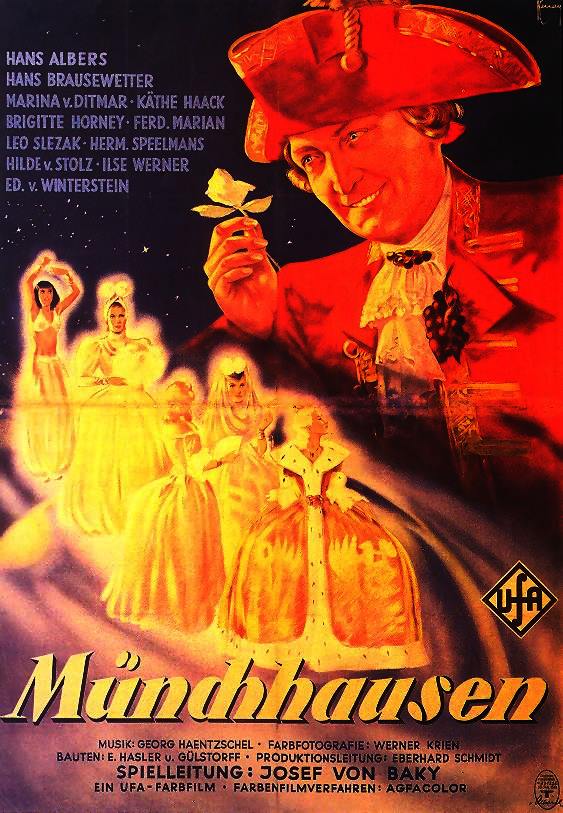Crew
Director – Josef von Baky, Screenplay – [uncredited] Berthold Burger (Erich Kastner), Based on the Book Baron Munchausen’s Narrative of his Marvellous Travels and Campaigns in Russiaby Rudolph Eric Raspe, Producer – Eberhard Schmidt, Photography – Werner Krien, Music – Georg Haentzchel, Special Effects – Konstantin Irmen-Tschet, Production Design – Otto Gülstorff & Emil Hasler. Production Company – Ufa Filmkunst.
Cast
Hans Albers (Baron Hieronymous von Münchhausen), Hermann Speelman (Christian Kuchenreutter), Brigitte Horney (Tsarina Katarina II), Ferdinand Marian (Count Cagliostro), Leo Slezak (Sultan Abu ul Hamid), Ilse Werner (Princess Isabella d’Este), Walter Lieck (The Runner), Hilde von Stolz (Louise La Tour), Werner Scharf (Prince Francesco d’Este), Gustav Waldau (Casanova), Hans Brauowetter (Freiherr Fritz von Hartenfeld), Marina von Ditmar (Sophie von Riedefel), Käthe Haack (Baronin Münchhausen), Marianna Simson (The Moon Woman), Jasper von Oertzen (Count Laskoi), Wilhelm Bendow (The Moon Man), Eduard von Winterstein (Father Münchhausen), Andrews Engelmann (Prince Potemkin), Hubert von Meyerinck (Prince Anton Ulrich)
Plot
In the present day, guests come to a party thrown by the present Baron von Münchhausen who has returned to occupy his family’s ancestral castle in Bodenwerder. Freiherr von Hartenfeld and his fiancee express interest in the Baron’s famous ancestor and the Baron invites them back to hear the story. He recounts various of the Baron’s exploits – how in St Petersburg the Baron became the lover of Tsarina Katarina II; how Count Cagliostro bestowed on the Baron his wish to be eternally youthful; the Baron’s flight across a battlefield by cannonball and capture by a Turkish sultan where the Baron finally won his freedom by betting that his runner could not race to Vienna and return with a bottle of alcohol in an hour; how the Baron and the Princess Isabella d’Este travelled to Venice and he avoided assassins and a duel with the Princess’s brother; and the Baron’s journey by balloon to The Moon where he found that one Earth year takes place in the space of a day and where the Moon’s inhabitants can detach their heads from their bodies.
Münchhausen is one of the truly fascinating artifacts of filmmaking to emerge from the Nazi era in Germany. The film was mounted at the personal behest of Propaganda Minister Joseph Goebbels. It was originally intended that Münchhausen would mark the 25th anniversary of Ufa Studios in 1942 but production overruns delayed its release beyond that point. Goebbels had been inspired by then-recent Hollywood fantasies such as The Wizard of Oz (1939), and in particular The Thief of Bagdad (1940), and desired to create something on a similarly epic scale that could compete with Hollywood. It was Goebbels’ ambition that the Babelsberg Studios where Münchhausen was made would come to replace Hollywood after the War ended. Münchhausen was such a prestigious production that Goebbels even gave special permission so that screenwriter Erich Kastner, the author of the classic children’s book Emil and the Detectives (1928), who was a banned writer under the Nazis, could be allowed to write the screenplay, albeit hiding under the pseudonym Berthold Burger.
Münchhausen is a remarkable film. Even more so when one considers the circumstances surrounding its making – namely that it was produced at the very height of World War II when Germany was undergoing severe shortages and cities were being regularly bombed by Allied forces. Even today, the lavishness of the film takes one aback. The visits to the Tsarina’s palace come with a hundred foot long banquet table where an igloo-sized cake is served up and opened to reveal a dwarf sitting playing a harpsichord, or where dessert consists of bowls of gems being served to guests. When the Baron sits down to dine with the Empress, a table containing his supper pops up from underneath the floor and then when she banishes him, the floor opens and he, table and sofa all slide under.

The scenes in Venice take place with dozens of gondolas all laden in garlands and uniformed gondoliers, not to mention what must have been the recreation of the canals of Venice. It is something so lavish that it leaves you gasping at the extravagance of how the Germans managed to put all of this together during the midst of Wartime shortages.
The scenes with the Turkish Sultan work the best – they come drolly underplayed with the Baron’s runner heading to Vienna to get a bottle of wine within an hour, but falling asleep under a tree until the Baron’s assistant shoots a fig into his mouth, followed by the Baron invisibly carrying the princess off. There is also the wonderfully colourful image of the balloon taking off into the skies above Venice and heading to The Moon.
The Moon itself is shown as full of giant fruits and bubbling pools, of babies growing in pods, of cherry trees that ripen within the space of an afternoon and fall by evening due to the Moon’s special time dilation effects and where the Moon Queen arrives as a flying detached head. There is also an undeniably wacky sense of humour to the film – of clothes that turn into barking dogs, or the cuckoo duel between two men shooting at one another in a darkened ballroom.

On the minus side, there is no narrative drive to Münchhausen and dramatically the film is stodgy. Despite inspired moments, it fails to fly with the sense of pure wonderment that its model The Thief of Bagdad did.
The story of Baron Munchausen, the self-proclaimed world’s greatest liar, has been filmed several times, including:- Georges Melies’s The Adventures of Baron Munchausen (1911); a British version in 1927; Baron Munchausen (1962), a part-live, part-animated version by Czech director Karel Zeman; and the French animated The Fabulous Adventures of Baron Munchausen (1977); and Baron Münchhausen (2012), a German tv mini-series. The most famous adaptation was Terry Gilliam’s The Adventures of Baron Munchausen (1989), which took its direct inspiration from Münchhausen here and copied a number of aspects – the immortal Baron, the scenes with the Sultan and the runner going to Vienna, the Moon people with their detachable heads – which are aspects of the Munchausen story that were invented by this film as opposed to taken from the original Rudolph Erich Raspe stories.
Full film available here


